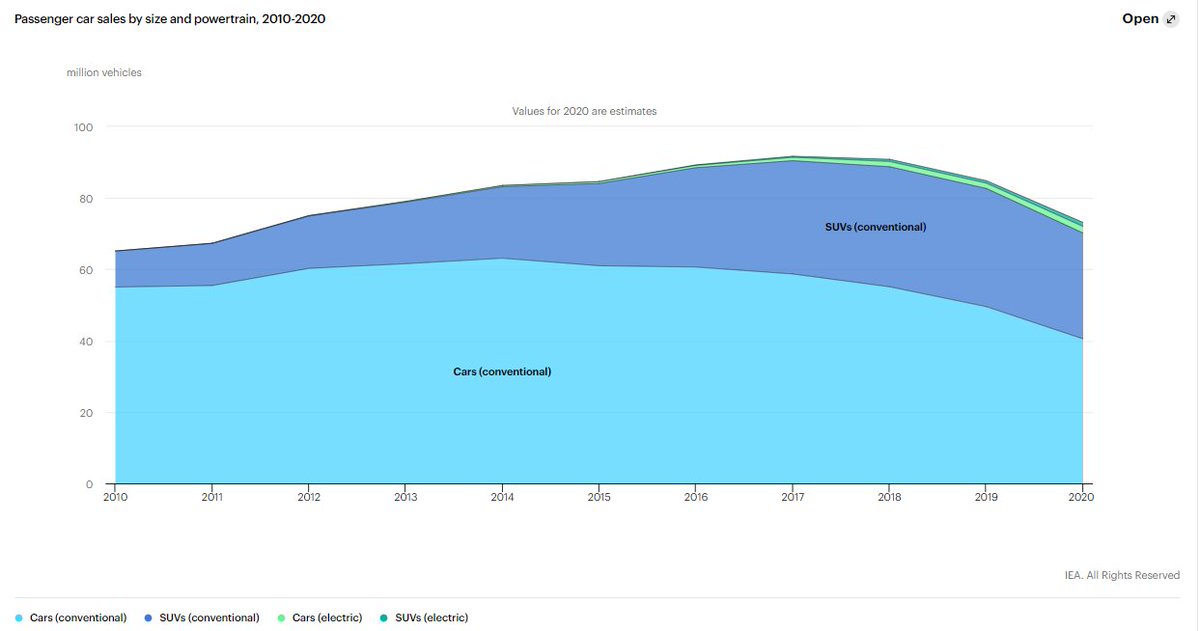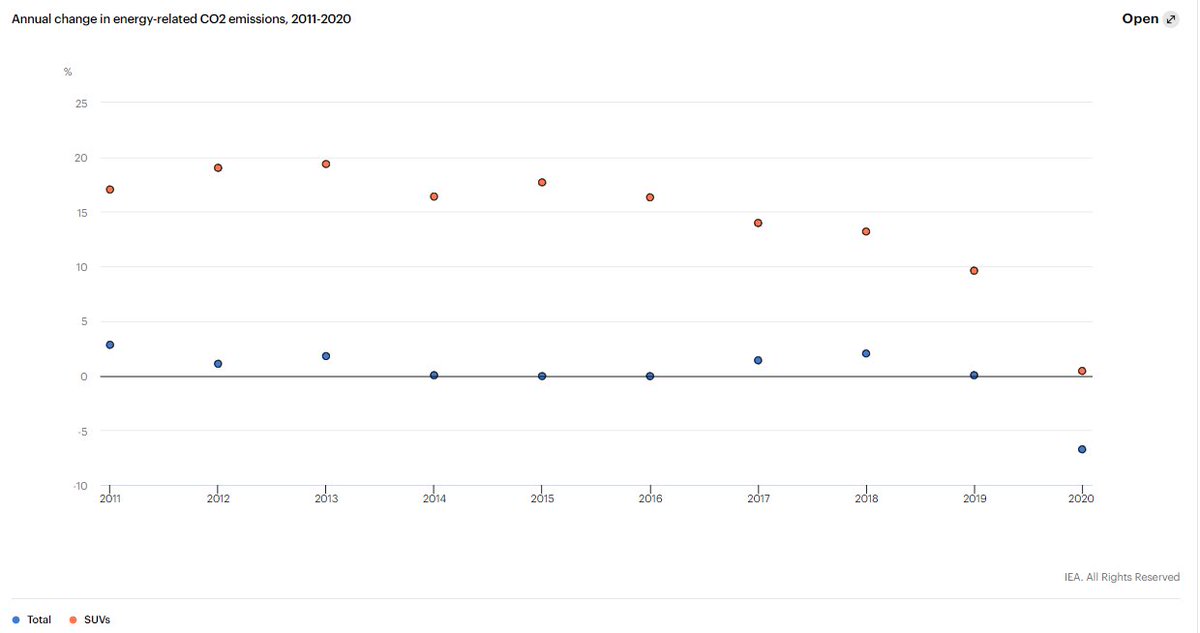Authors Glen Peters
7 days
30 days
All time
Recent
Popular
To say "the remaining carbon budget for 1.5°C is 440 GtCO₂" [add favorite number] is highly misleading
Taking a narrow 67–33% range, the value is 230–670 GtCO₂, but full range (left) could be −1000 - 2000 GtCO₂... (yes, could be negative or huge)
1/
https://t.co/T9GvpoH0l8

When I wrote "studies ranging from −100 to about 800 GtCO₂" back in 2018 I was being very conservative (there were no full uncertainty analyses then) https://t.co/KhyA1rYpDJ
Good to see papers (now) being much more explicit about the uncertainty & range...
2/
I have problems with the remaining carbon budgets presented as a single number, instead of a range. Is there any other climate variable presented as a one-sided probability? The ECS, eg, is presented as a range.
https://t.co/KhyA1rYpDJ
Good to see the authors use ranges!
3/
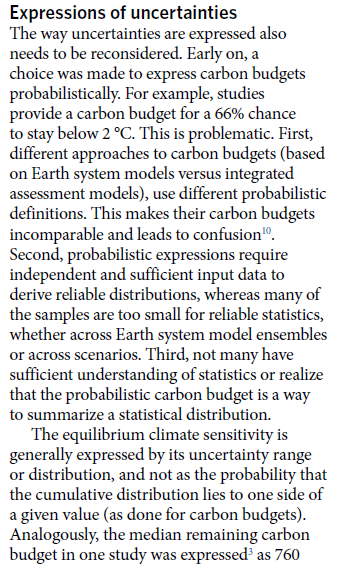
The uncertainties on remaining carbon budgets are huge. Let that sink in.
There is a decent chance the remaining carbon budget for 1.5°C is negative... (ie, too late)
[The uncertainties here are 33-66%, IPCC would usually take "likely" which is more like 16-84%]
4/
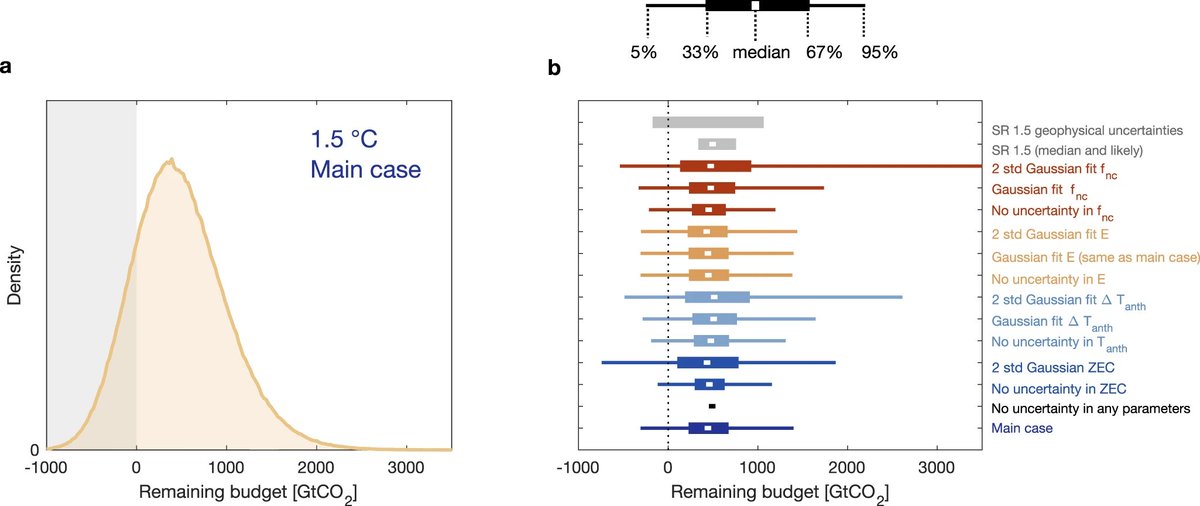
Many of these issues were discussed by me https://t.co/KhyA1rYpDJ & @Oliver_Geden https://t.co/Kj7heJTALN
Back in 2016 I raised many of the same issues: https://t.co/bjOnjQWOqc
[I guess I should publish articles & not commentaries, as perhaps people would read them...]
5/
Taking a narrow 67–33% range, the value is 230–670 GtCO₂, but full range (left) could be −1000 - 2000 GtCO₂... (yes, could be negative or huge)
1/
https://t.co/T9GvpoH0l8

When I wrote "studies ranging from −100 to about 800 GtCO₂" back in 2018 I was being very conservative (there were no full uncertainty analyses then) https://t.co/KhyA1rYpDJ
Good to see papers (now) being much more explicit about the uncertainty & range...
2/
I have problems with the remaining carbon budgets presented as a single number, instead of a range. Is there any other climate variable presented as a one-sided probability? The ECS, eg, is presented as a range.
https://t.co/KhyA1rYpDJ
Good to see the authors use ranges!
3/

The uncertainties on remaining carbon budgets are huge. Let that sink in.
There is a decent chance the remaining carbon budget for 1.5°C is negative... (ie, too late)
[The uncertainties here are 33-66%, IPCC would usually take "likely" which is more like 16-84%]
4/

Many of these issues were discussed by me https://t.co/KhyA1rYpDJ & @Oliver_Geden https://t.co/Kj7heJTALN
Back in 2016 I raised many of the same issues: https://t.co/bjOnjQWOqc
[I guess I should publish articles & not commentaries, as perhaps people would read them...]
5/
The anatomy of a scenario...
A 𝘁𝗵𝗿𝗲𝗮𝗱 on how mitigation works, why we probably need some level of carbon capture & storage (CCS) & carbon dioxide removal (CDR) - just not as much as in scenarios.
Based on my presentation ↦ https://t.co/j5uLxUi0xF
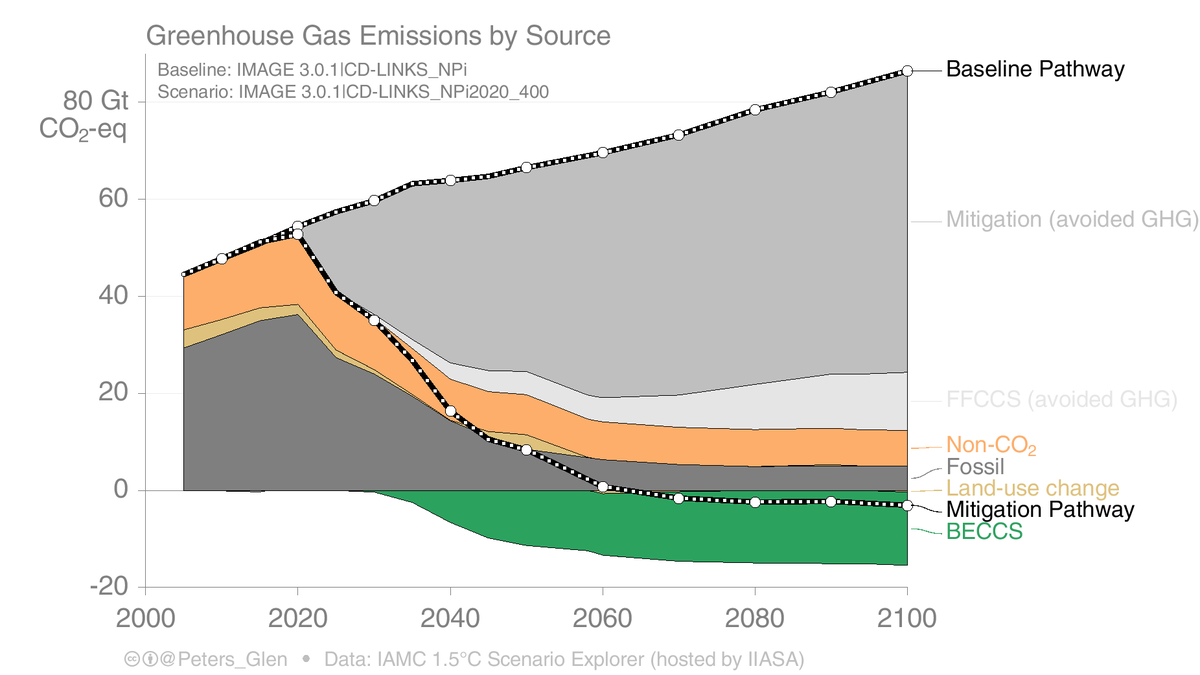
2. We start with a baseline or reference scenario, that assumes no or limited mitigation. If we want to stay "well below 2°C" we need to get rid of the dark grey & be net-zero!
We can argue about the baseline, but for the purposes here, it doesn't matter https://t.co/C0dAdj65tl
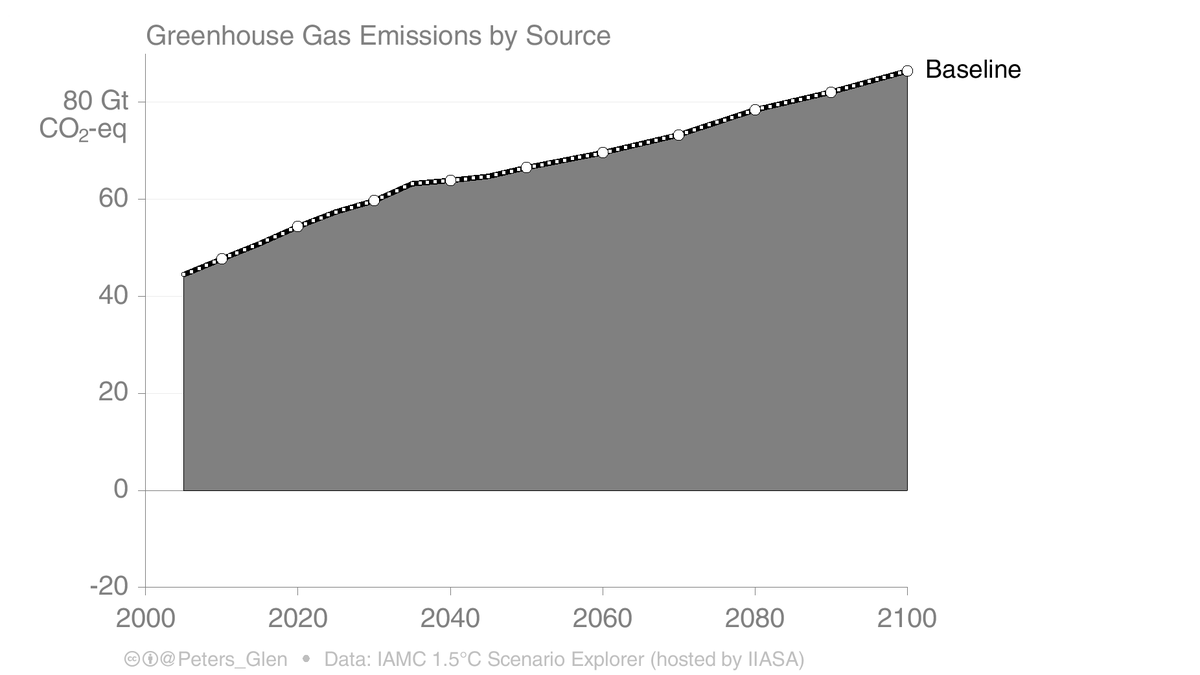
3. The heavy lifting is done by conventional mitigation: behavioural change, energy efficiency, fuel switching (fossils to non-fossils), changed transport, dematerialisation, etc, etc...
But, scenarios suggest this is not enough to get rid of all greenhouse gases.
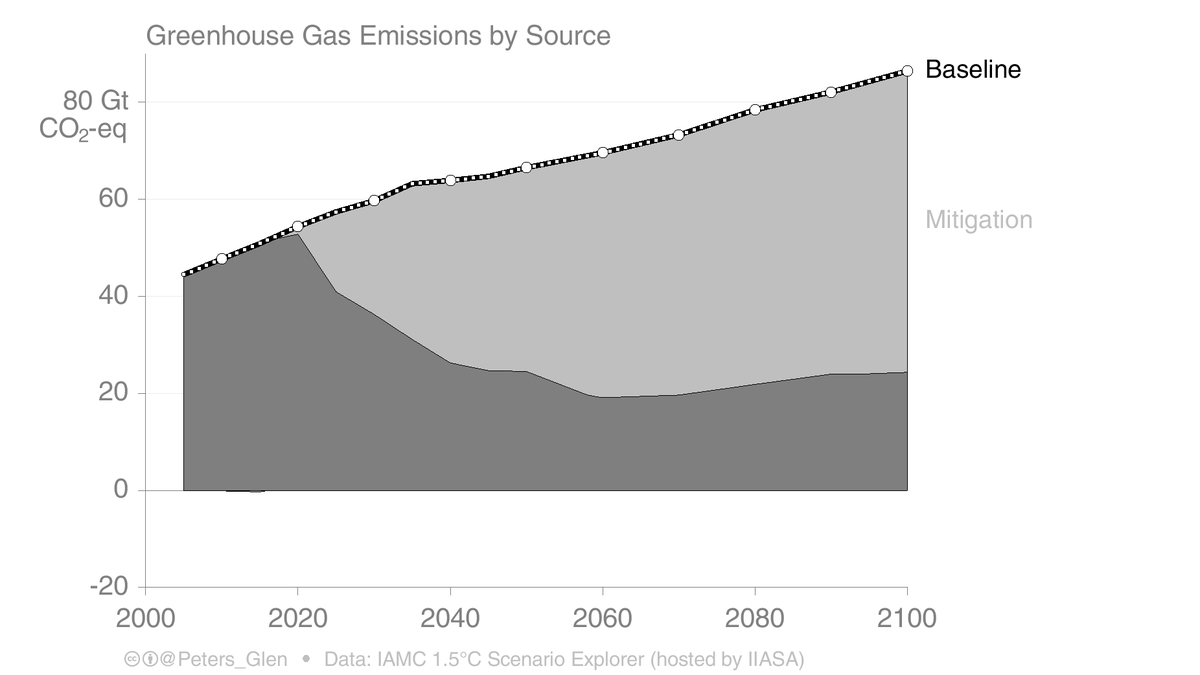
4. In some sectors, particularly some industrial sectors, perhaps the cheapest or only way to mitigate is with carbon capture & storage (CCS), eg, cement, steel, chemicals, etc
This is one reason we need CCS...
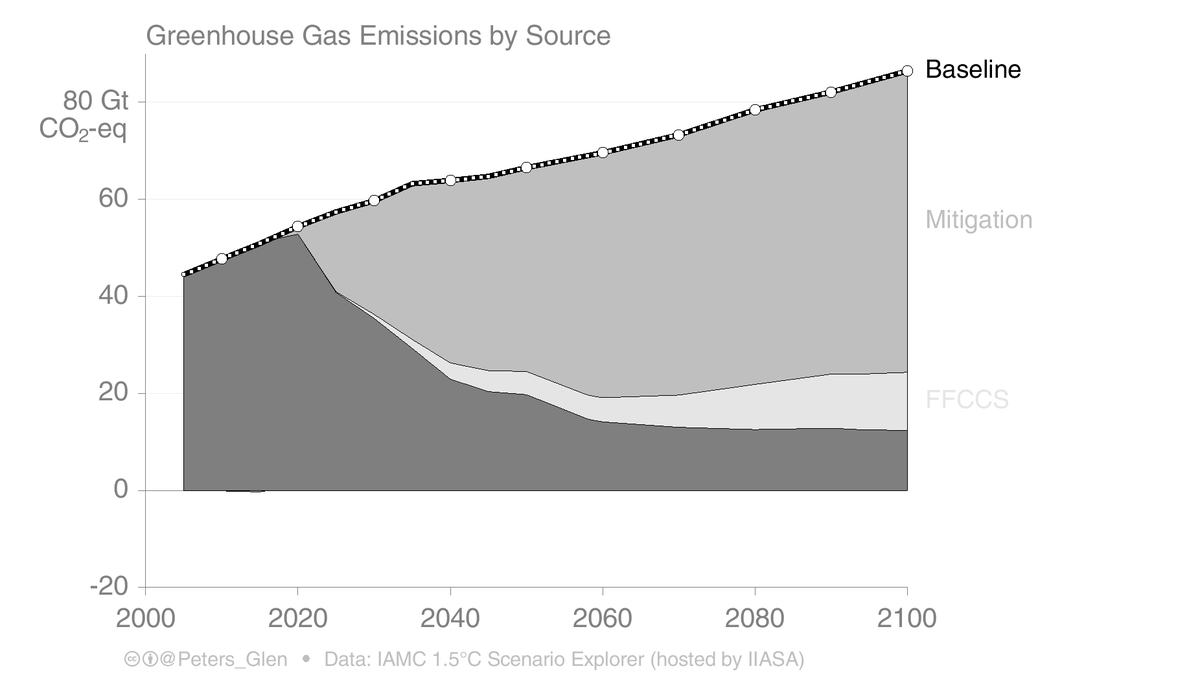
5. We can't forget about non-CO₂ emissions. We can probably get most non-CO₂ out of industry, but what about agriculture? Even if we change diet, reduce food waste, etc, we may not be able to eliminate CH₄ or N₂O from agriculture.
Some CO₂ & non-CO₂ remains (dark grey)...
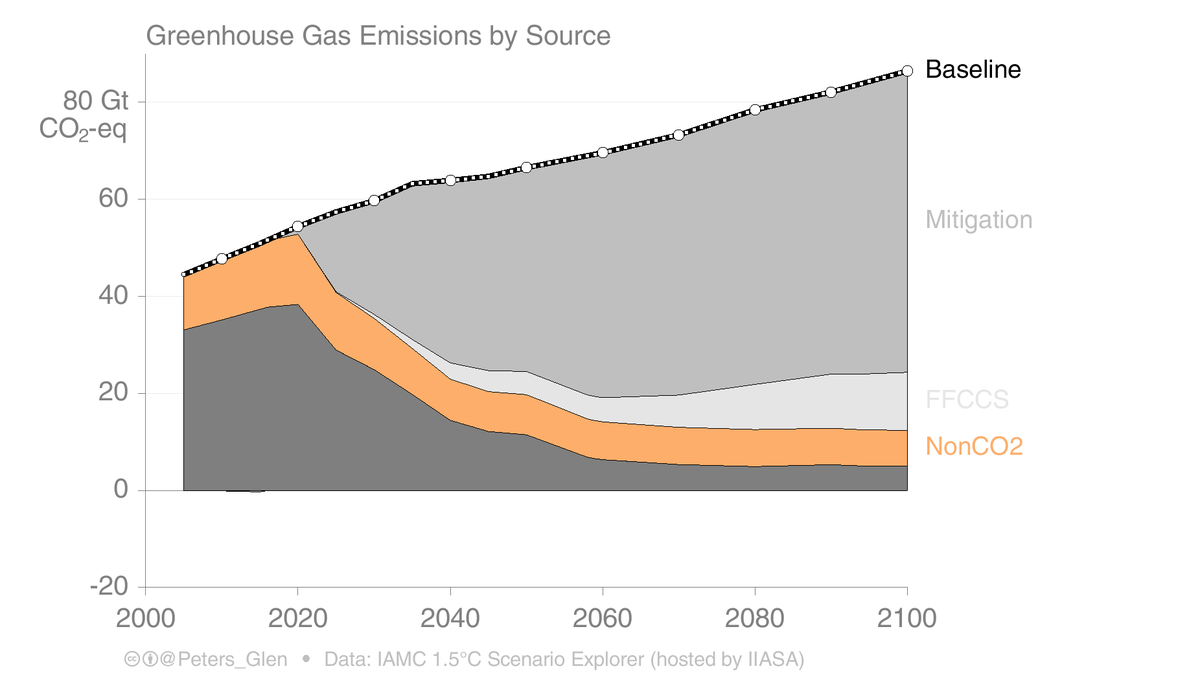
A 𝘁𝗵𝗿𝗲𝗮𝗱 on how mitigation works, why we probably need some level of carbon capture & storage (CCS) & carbon dioxide removal (CDR) - just not as much as in scenarios.
Based on my presentation ↦ https://t.co/j5uLxUi0xF

2. We start with a baseline or reference scenario, that assumes no or limited mitigation. If we want to stay "well below 2°C" we need to get rid of the dark grey & be net-zero!
We can argue about the baseline, but for the purposes here, it doesn't matter https://t.co/C0dAdj65tl

3. The heavy lifting is done by conventional mitigation: behavioural change, energy efficiency, fuel switching (fossils to non-fossils), changed transport, dematerialisation, etc, etc...
But, scenarios suggest this is not enough to get rid of all greenhouse gases.

4. In some sectors, particularly some industrial sectors, perhaps the cheapest or only way to mitigate is with carbon capture & storage (CCS), eg, cement, steel, chemicals, etc
This is one reason we need CCS...

5. We can't forget about non-CO₂ emissions. We can probably get most non-CO₂ out of industry, but what about agriculture? Even if we change diet, reduce food waste, etc, we may not be able to eliminate CH₄ or N₂O from agriculture.
Some CO₂ & non-CO₂ remains (dark grey)...


